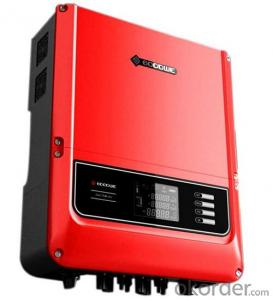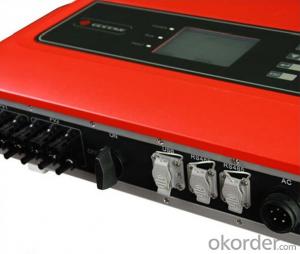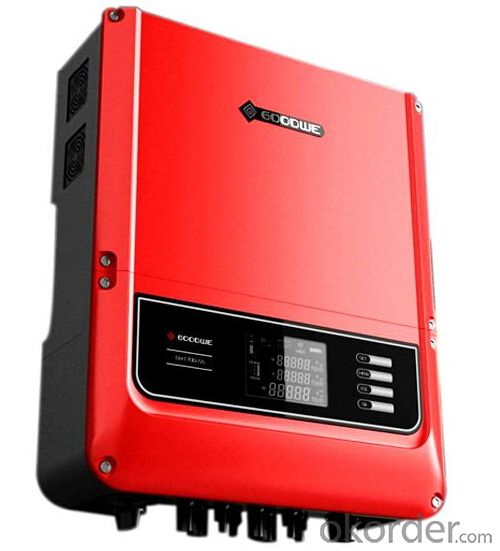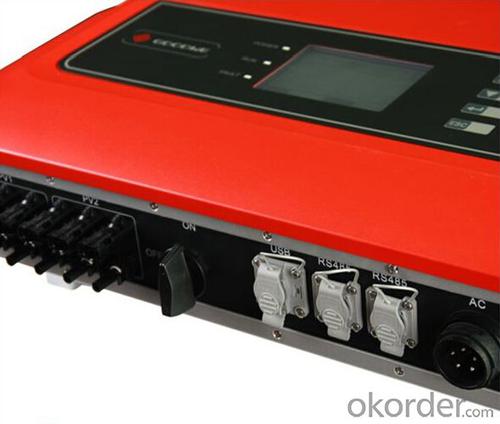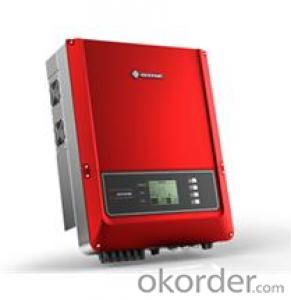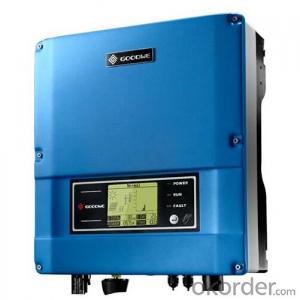UK Solar Inverter Gw15k-Dt On Grid
OKorder Service Pledge
Quality Product, Order Online Tracking, Timely Delivery
OKorder Financial Service
Credit Rating, Credit Services, Credit Purchasing
You Might Also Like
GW15K-DT
GW15K-DT photovoltaic inverter is suitable for commercial and industrial roofs as well as small and medium-sized photovoltaic power systems.
Intelligent heat dissipation design ensures slower temperature rise and more stable running conditions.
The dual-lines MPPT extra-wide voltage range ensures that the system is with more flexible configuration
Datasheet
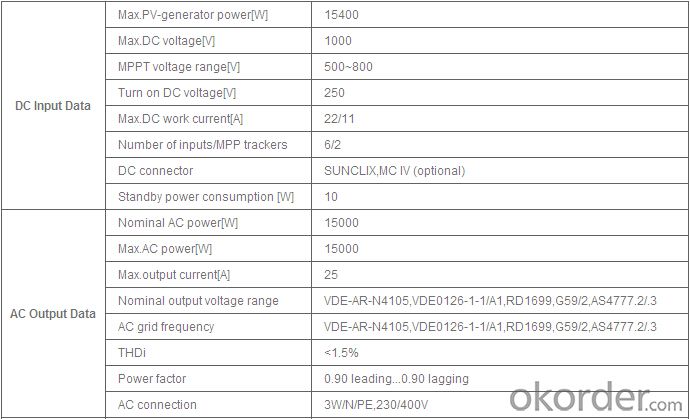
- Q: How does the weight of a solar inverter affect its installation process?
- The weight of a solar inverter can significantly impact its installation process. Heavier inverters may require additional support structures or mounting equipment to ensure proper installation and stability. They may also require more manpower and specialized equipment during the installation process. Conversely, lighter inverters may be easier to handle and install, potentially reducing installation time and effort. Therefore, the weight of a solar inverter is an important consideration that can influence the overall installation process.
- Q: What are the safety considerations when installing a solar inverter?
- Some safety considerations when installing a solar inverter include ensuring proper grounding and electrical connections, following manufacturer's guidelines and instructions, and having a licensed electrician perform the installation. It is also important to be cautious of potential electrical hazards and to handle the inverter with care to avoid any personal injuries.
- Q: How does a solar inverter handle voltage harmonics?
- A solar inverter handles voltage harmonics by incorporating filters and control algorithms that mitigate harmonics and ensure a smooth and stable output voltage.
- Q: What is the role of a solar inverter in a solar power system?
- The role of a solar inverter in a solar power system is to convert the direct current (DC) electricity generated by the solar panels into alternating current (AC) electricity that can be used to power household or commercial appliances and feed excess energy back into the grid.
- Q: Three-phase photovoltaic inverter grid, the use of phase-locked loop is what?
- Photovoltaic inverters for grid-connected photovoltaic power generation systems are primarily capable of receiving DC power from photovoltaic arrays and converting them into sine-wave currents of the same frequency and in phase with the access grid for powering the grid or local loads.
- Q: Can a solar inverter be used in regions with high levels of dust or debris?
- Yes, solar inverters can be used in regions with high levels of dust or debris. However, it is important to regularly clean and maintain the solar panels and inverters to ensure optimal performance and prevent any potential damage caused by the accumulation of dust or debris.
- Q: Can a solar inverter be used in systems with different module voltages?
- Yes, a solar inverter can be used in systems with different module voltages. Solar inverters are designed to convert the direct current (DC) generated by solar panels into alternating current (AC) that can be used in the electrical grid or for powering appliances. They are equipped with maximum power point tracking (MPPT) technology, which allows them to adjust and optimize the voltage and current output to match the specific voltage requirements of the solar panels. This flexibility enables solar inverters to work efficiently with various module voltages, making them compatible with different solar system configurations.
- Q: What is the role of a fault detection feature in a solar inverter?
- The solar inverter relies on a fault detection feature to oversee and detect any irregularities or malfunctions within the system. This crucial feature is essential for the smooth and efficient functioning of the solar inverter. Constantly monitoring the solar inverter's various components and parameters, such as input and output voltages, current levels, temperature, and other critical factors, the fault detection feature analyzes real-time data and compares it to predetermined thresholds or expected values. If any parameter strays from the normal range or exceeds set limits, the fault detection feature promptly identifies it as a fault or abnormality. The primary objective of this feature is to safeguard the solar inverter from potential harm and prevent any safety risks. By swiftly detecting faults, the inverter can take appropriate actions to address the issue or shut down the system if necessary. This safeguards the inverter and other connected devices from further damage. Additionally, the fault detection feature aids in troubleshooting and determining the root cause of the fault. It offers valuable information about the fault's type and location, enabling faster and more accurate repairs or maintenance. This reduces downtime and ensures optimal performance and longevity of the solar inverter. Furthermore, the fault detection feature plays a vital role in system monitoring and maintenance. It provides valuable data and notifications to system operators or maintenance personnel, allowing them to proactively address any potential issues. This maximizes the uptime of the solar inverter and minimizes overall maintenance costs. To summarize, the fault detection feature in a solar inverter continuously monitors, identifies, and responds to faults or abnormalities in the system. Acting as a protective mechanism, it ensures the safe and reliable operation of the inverter, enables swift troubleshooting, and facilitates efficient maintenance practices.
- Q: How does a solar inverter handle voltage stability in the grid?
- A solar inverter manages voltage stability in the grid by regulating the voltage levels of the electricity generated from the solar panels. It ensures that the voltage produced by the solar panels matches the voltage required by the grid, thus maintaining a stable and consistent voltage throughout the system. Additionally, solar inverters may also have features like reactive power control and voltage regulation capabilities, which further contribute to maintaining voltage stability in the grid.
- Q: Are there any safety considerations when installing a solar inverter?
- Yes, there are several safety considerations when installing a solar inverter. Firstly, it is important to ensure that the installation is done by a qualified professional who has the necessary knowledge and expertise. Additionally, proper grounding and electrical connections should be established to minimize the risk of electric shocks or fires. Adequate ventilation and protection from moisture should also be provided to prevent overheating and damage. Lastly, it is crucial to follow all manufacturer's instructions and local building codes to ensure a safe and compliant installation.
Send your message to us
UK Solar Inverter Gw15k-Dt On Grid
OKorder Service Pledge
Quality Product, Order Online Tracking, Timely Delivery
OKorder Financial Service
Credit Rating, Credit Services, Credit Purchasing
Similar products
Hot products
Hot Searches
Related keywords
